Top 10 Web3 Wallets to Secure Your Crypto and Maximize Gains in 2025
Take a Quick Look
Looking for the best Web3 wallet to secure your crypto? Check out our guide to the top options and learn how AdsPower simplifies multi-account crypto management!
With the world gradually embracing bankless financial systems and blockchain technology our physical wallets also needed an alternative.
There needed to be wallets that keep users in full control of their funds and ensure their balance remains hidden from any "2nd party" let alone 3rd parties.
The developers realized the need of time and came up with what we know today as web3 wallets. These wallets don't just store your money like traditional wallets. Rather they work with all types of digital assets and have state-of-the-art security measures in place.
In this article we will explain what is a Web3 wallet and introduce you to some of the best Web3 wallets the new generation of internet has to offer. So let's begin.
What is a Web3 Wallet?

Web3 wallets are digital wallets that enable users to interact with decentralized applications (dApps) and manage their cryptocurrency assets. Unlike traditional wallets that only store currency, web3 wallets also handle digital identities by providing access to various blockchain-based services.
Web3 wallets operate on blockchain technology, meaning they interact with decentralized networks rather than centralized systems like banks. If you're looking for decentralized platforms to trade crypto without identity verification, check out 5 Best No KYC Crypto Exchange and Why You Should Use Them."
When you create a web3 wallet, you generate a pair of cryptographic keys:
-
public key: this acts like an address that you share to receive assets
-
private key: used to sign transactions and access your funds.
When you initiate a transaction through a web3 wallet, the wallet generates a transaction intent containing the details. This intent is signed using your private key, which ensures the transaction's authenticity and security.
The signed transaction is then broadcast to the blockchain network for validation and completion.
It's crucial to keep the private key secure, as losing it means losing access to your wallet.
Inside a Web3 wallet, users can store various digital assets, including cryptocurrencies like Bitcoin and Ethereum, as well as non-fungible tokens (NFTs).
These wallets also store permissions and authentication data needed to use different dApps.
The innovation of web3 wallets lies in their ability to allow users to participate in activities like staking, lending, borrowing, and trading directly from their wallet interface, often without needing to go through an intermediary. To enhance security, organization, and efficiency, users often manage multiple wallets, distributing their digital assets across different wallets.
Web3 wallets are classified into two categories: cold and hot wallets. Here's the difference between a cold wallet vs hot wallet.
Cold Wallet VS Hot Wallet in Web3
Hot Wallets refer to web3 wallets that are connected to the internet. This online connection makes them ideal for frequent transactions. They store private keys online, which makes them more accessible but also more vulnerable to cyber attacks.
Common types of hot wallets include mobile wallets, desktop wallets, and browser wallets.
In contrast, cold wallets are web3 wallets that store private keys offline. They are less convenient for everyday transactions but are highly resistant to online hacking attempts.
Types of cold wallets include hardware wallets, paper wallets, and offline computers.
The 10 Best Web3 Wallets
Here's a list of the best Web3 wallets for your digital assets.
MetaMask
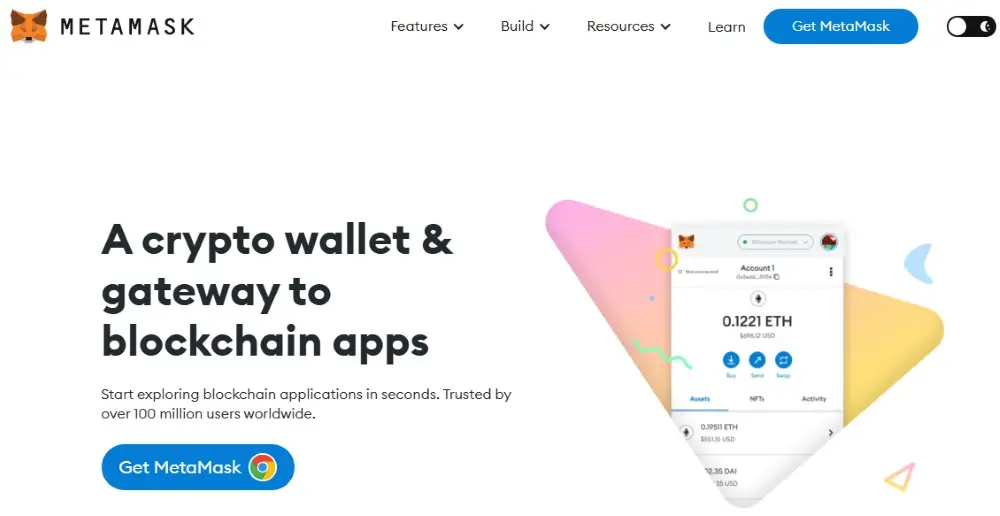
MetaMask is one of the most popular web3 wallets with over 100 million users globally. As a hot crypto wallet, MetaMask operates as a browser extension and mobile app and provides an easy setup process and a user-friendly interface.
It allows users to manage their Ethereum-based assets and interact with decentralized applications (dApps) directly. MetaMask is non-custodial as it gives users complete control over their private keys and assets by generating passwords and keys locally.
Using MetaMask users can track wallet balances, claim airdrops and NFTs and convert crypto-to-cash or cash-to-crypto in a few clicks.
Some blockchains supported by MetaMask include Ethereum, Ethereum based ERC-20 tokens, Binance Smart Chain and a number of Layer-2 networks.
Coinbase Wallet
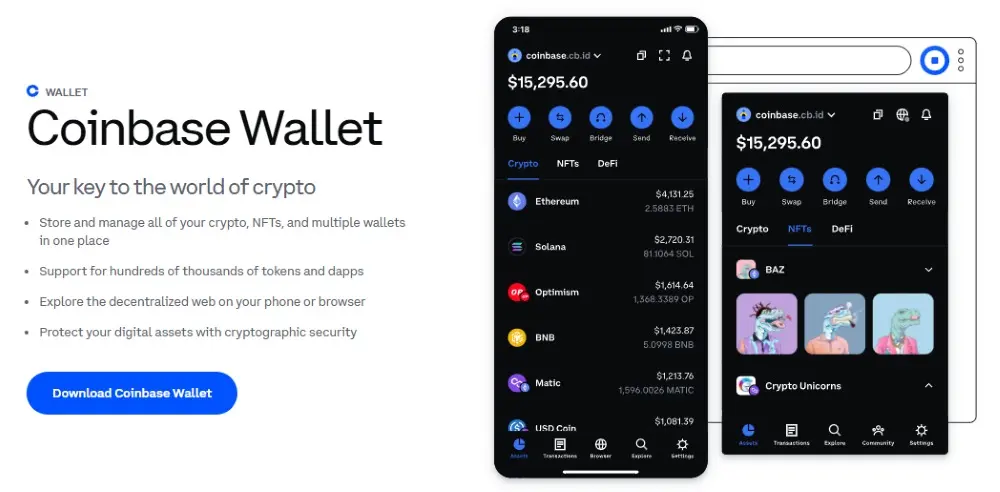
Coinbase Wallet is a self-custody web3 wallet that provides users with full control over their private keys and cryptocurrency assets.
It allows for secure storage and transfer of digital assets. Coinbase wallet is available on Android, iOS, and browsers and supports various cryptocurrencies including Ethereum ERC-20 tokens, Bitcoin, and more.
Additionally, it supports ETH Layer-2 solutions like Arbitrum and Polygon for efficient transactions. Despite its limited asset support, Coinbase Wallet stands out for its ease of use, integration with the Coinbase exchange, and robust security measures, all of which make it one of the best web3 wallets available.
It also offers advanced security features such as biometric authentication and PIN protection.
Trust Wallet
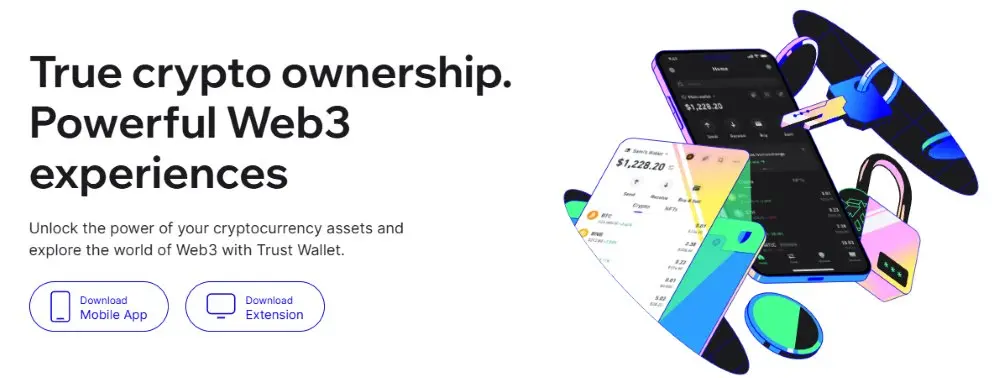
Trust Wallet is a mobile-first, self-custody web3 wallet renowned for its versatility and support for over 100 blockchains. The wallet accommodates more than 10 million digital assets and 600 million NFTs.
The Web3 wallet features built-in staking rewards, which allow users to earn passive income from staking 24 different cryptocurrencies.
The wallet's user-friendly interface and built-in Web3 browser facilitate seamless interaction with decentralized applications (dApps) and NFT marketplaces.
By offering a browser extension and a mobile app for both iOS and Android, Trust Wallet remains one of the best web3 wallets for managing crypto and NFTs on the go.
ZenGo

Zengo is a highly secure web3 wallet, ideal for crypto investors with large holdings. It uses Multi-Party Computation (MPC) technology to eliminate private key vulnerabilities by distributing key segments across multiple parties.
Zengo offers a user-friendly app for iOS and Android and supports a long list of cryptocurrencies, including Bitcoin, Ethereum, Dogecoin, and Polygon, to name a few.
The wallet features 3-factor authentication, which combines email verification, 3D FaceLock technology, and a recovery file stored in the cloud.
Additionally, Zengo provides in-app crypto purchases, an NFT wallet, token swaps, and 24/7 customer support.
Zerion
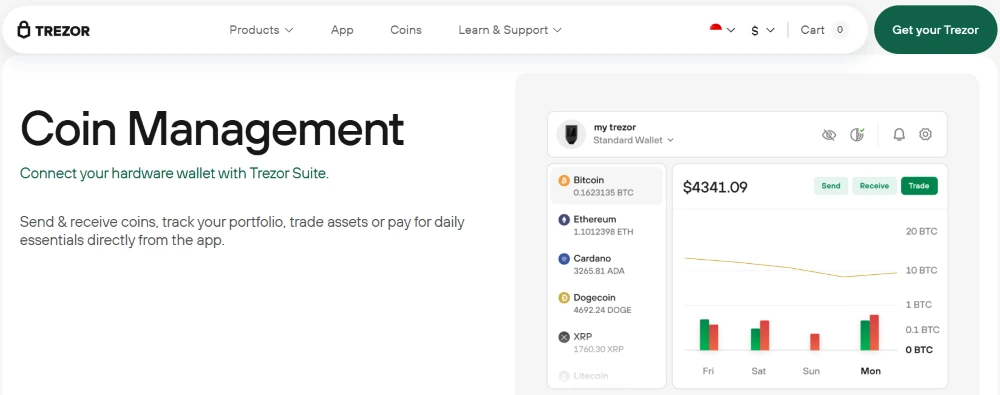
Zerion is a mobile-first web3 wallet designed for managing DeFi and NFT portfolios. This web3 wallet allows users to connect various wallets, including Ledger hardware wallets, for centralized portfolio management.
Zerion's built-in trading and bridging aggregator helps users find the best deals across major blockchains. The wallet's social features enable users to follow other wallets, receive NFT drop notifications, and track assets.
Additionally, Zerion provides developer-friendly tools like a Websocket API and DeFi SDK for seamless DeFi integration. As a non-custodial wallet, Zerion ensures no one can suspend your wallet or meddle in your transactions. The wallet exists both as a mobile app and browser extension.
Trezor

Trezor, developed by SatoshiLabs, is renowned as the first hardware web3 wallet, designed to securely store private keys offline.
It supports over 1000 cryptocurrencies, including BTC, ETH and ERC-20 tokens. Trezor ensures security with features like a PIN, 2-factor authentication, and a 24-word recovery seed.
The hardware wallet device is small, can easily fitt into a pocket, and comes with an LED display that serves as an interface for the user. The Trezor Model T, an advanced version, includes a touchscreen for more intuitive navigation.
Although it has a less beginner-friendly interface compared to some competitors, it remains a good choice for secure asset storage. Trezor's high security and extensive support for various cryptocurrencies make it a leading web3 wallet, despite its higher cost (starting from $59) and complexity for new users.
Ledger

Ledger wallets are renowned hardware web3 wallets designed for secure offline storage of private keys.
These hardware wallets, such as the Ledger Nano S Plus and Ledger Nano X, support thousands of cryptocurrencies and NFTs and work with numerous dApps.
The design of Ledger Nano wallets resemble a USB device, with some models offering Bluetooth connectivity and compatibility with Ledger Live app for managing assets.
For providing high security, Ledger wallet uses a Secure Element chip and a 24-word recovery phrase for account recovery.
Currently, Ledger's top-tier model is the Ledger Stax which includes a larger E-ink touchscreen, wireless charging, and support for a wide range of digital assets. For a complete comparison of Ledger devices, visit their official webpage.
Rainbow

Rainbow Wallet is a multi-chain crypto wallet known for its lively, user-friendly interface and robust feature set. The wallet is designed for both beginners and experienced users and offers comprehensive wallet management, secure DeFi integration, and extensive NFT capabilities.
Rainbow supports Ethereum and loads of other L2 chains. It provides functionalities such as instant swaps, Ethereum gas price predictions, and the ability to view and manage NFTs.
It also integrates with popular hardware wallets like Ledger and Trezor for centralized control. Overall the wallet is a unique choice among competitors.
Argent
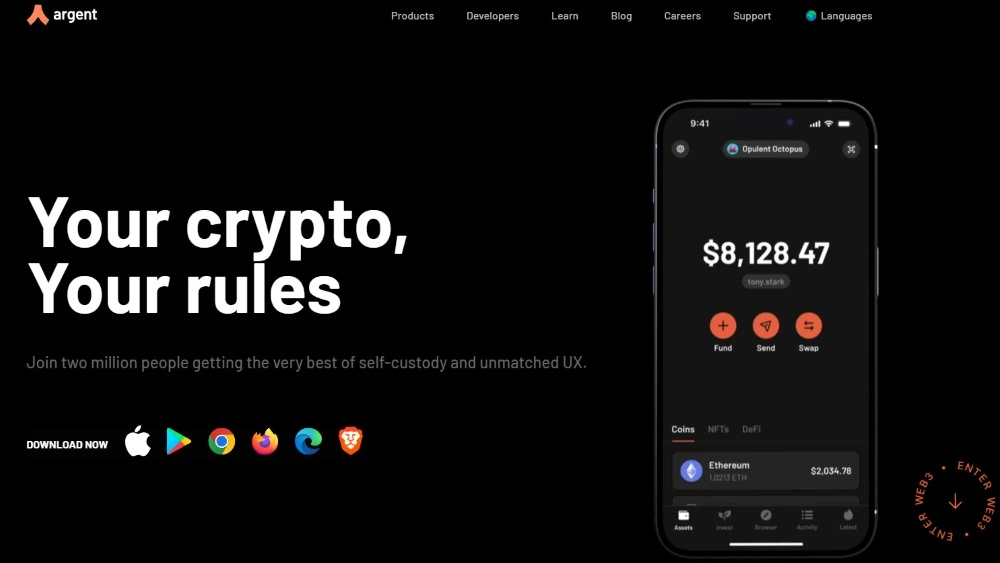
Argent stands out as a mobile-first web3 wallet with a user-friendly design, tailored for Ethereum and ERC-20 users. It offers a unique combination of security and DeFi accessibility, making it a top choice for crypto enthusiasts.
The wallet prioritizes safety through innovative features like social recovery, which eliminates the need for traditional seed phrases. Users can designate trusted guardians—such as friends, family, or other devices—for account recovery, significantly reducing the risk of losing access to their funds. Argent also natively integrates popular DeFi protocols, enabling users to lend, borrow, and earn interest directly from the app.
Its slick interface simplifies managing Ethereum-based assets, while Layer-2 solutions like zkSync and StarkNet ensure faster transactions with lower fees. Additionally, Argent supports staking, NFT management, and in-app token swaps, providing a comprehensive platform for crypto investors.
However, Argent currently lacks a desktop platform, being limited to iOS and Android mobile apps. Its exclusive focus on Ethereum-based assets and the upfront network fee required to create a wallet may deter first-time users. Despite these limitations, Argent remains a powerful choice for those looking to explore the Ethereum ecosystem with added security and ease of use.
Rabby Wallet

Rabby Wallet is a browser extension wallet tailored for DeFi enthusiasts. Its standout feature is the ability to pre-sign transactions by simulating their effects, ensuring users have full visibility before committing to any action.
Designed with advanced security in mind, Rabby Wallet operates in a non-custodial manner and supports multiple chains, including Ethereum, BNB Smart Chain, and Polygon. It automatically connects users to the appropriate blockchain network based on the dApp they're interacting with, streamlining the user experience.
Additionally, Rabby Wallet includes multi-address management, which allows users to switch between wallets effortlessly, and integrates hardware wallet support for added security. These features make it an excellent choice for active DeFi users seeking a powerful and reliable web3 wallet.
Fund Your Web3 Wallet With Free Crypto Using AdsPower
While all these web3 wallets are fascinating, they're of no use if your crypto bank is empty. But worry not, there are ways to earn crypto for free and get some coins to invest. These methods require you to stay online and perform some actions such as tweeting, viewing ads or playing games.
However, you cannot earn a good amount of coins with these methods unless you make multiple browser profiles. But multi-profiling has a risk of account suspension if the crypto platform tracks you.
So how can you maximize your free earnings while also avoiding detection? The solution lies with AdsPower. AdsPower is an anti-detect browser specifically designed for secure multi-accounting while staying under the radar.
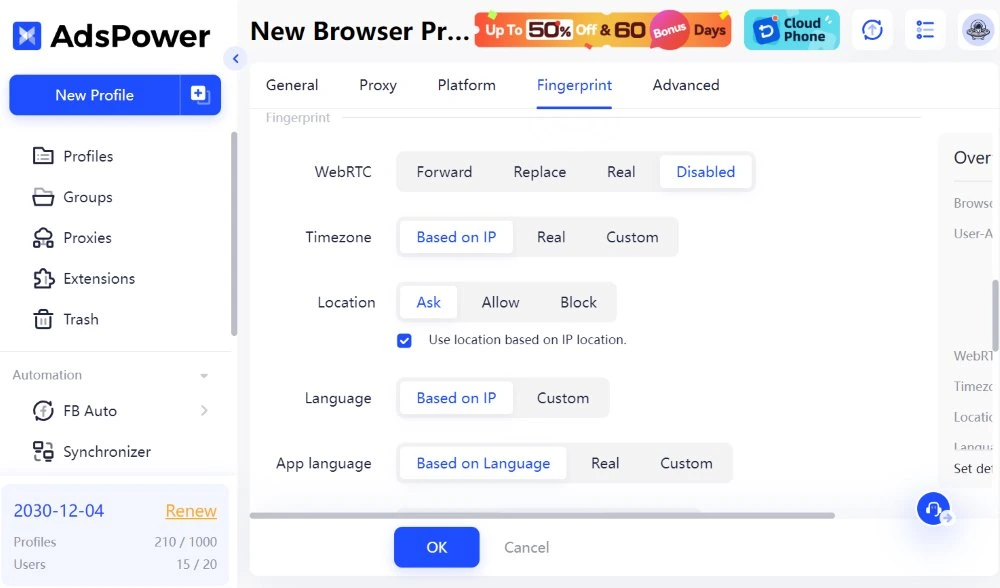
It uses advanced features such as fingerprint spoofing to prevent browsers from making a unique digital profile of you.
So sign up for AdsPower today and level up your crypto game.

People Also Read


